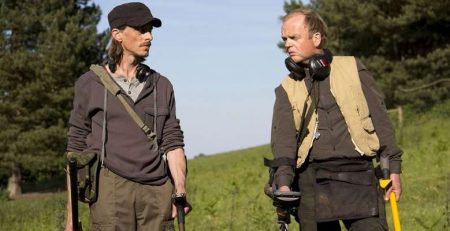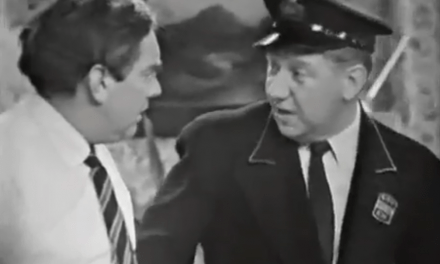At the end of the year BBC4 will be screening the third and final series of Detectorists (BBC/Channel X 2013 -), the sitcom written, directed by and starring Mackenzie Crook about a group of metal detector enthusiasts (‘detectorists’) in East Anglia. Detectorists has won a BAFTA and gained a small but dedicated following (including me) and here I’d like to suggest some ways in which it creates such pleasure in its audience and how the relationship between the programme and its viewers is constructed.
I believe that part of the pleasure of Detectorists is the use of delayed gratification within the show. In an era of bingeing it uses time and space to deliver ever increasing returns as we get to know the characters and their world. This is a pleasure enhanced by the weekly broadcast – knowing Detectorists will be on next week (incoherent scheduling of the repeats by the BBC allowing) becomes something to look forward to, to help us through the demands of modern life. There is an obvious metaphor here which the show’s creators mine. The detectorists are exploring the earth, digging in vain for years in the hope of finding gold or at least something that isn’t just ‘buttons and buckles and ring-pulls’. In the show’s theme song sung by Johnny Flynn he asks “Will you search through the lonely earth for me?/Climb through the briars and brambles?/ I will be your treasure/ I’m waiting for you…” and for many of its audience we do find treasure, a programme that while it might initially seem to deal with the humdrum and mundane actually reveals the complexity of its characters’ lives (and thus our own) and a rich vein of humour. A show about nothing is actually about everything; love, loss, pain, ambition, frustration, envy, fear, endurance, contentment and laughter.
Patience and engagement by the viewer is rewarded with some comic gold; slow-burn jokes are glimpsed then revealed in all their glory further down the line. An example is Sheila’s home-made lemonade. Sheila (Sophie Thompson), the somewhat ethereal wife of metal detector club president Terry (Gerard Horan), serves up this brew of extraordinary tartness to Lance (Toby Jones) and Andy(Crook) in series 1 and we see their attempts at concealing its effects (gosh that’s …lemony’). At the end of series 2 Sheila offers lemonade to the whole group and Andy and Lance encourage them to accept, holding back on drinking it themselves. Rather than exclamations of disgust we see the scene when Sheila leaves the room; a tableau of the group contorted in positions of pain and discomfort. As well as a satisfying reward for those audience members who have committed time to the series, underlined by the space the scene allows for us to recognise the joke rather than it be telegraphed through the script, this brief visual gag reveals something else about the programme; the respect and dignity given to its characters, who in turn display respect and dignity. Nobody would dream of upsetting Sheila by saying they didn’t like the drink, because she is a nice person who while eccentric, means well. Equally Terry is a rather bossy, bluff ex-policeman not above calling on his old colleagues to sort out his problems but he is also a devoted husband who opts to lindy-hop with his wife rather than accompanying the gang on their stake-out of ‘nighthawks’. ‘Dancing more important than detecting then?’ accuses Lance ‘No, but Sheila is’, Terry retorts.
All the members of their club (if not their rivals the ‘dirtsharks’) are accorded this empathy, including chief protagonists Andy and Lance. Andy is a passive underachiever whose endless dithering drives his wife Becky (Rachael Stirling) mad but he is also a good man, interested in the world around him. Lance at first glance might appear an unprepossessing, boorish hobbyist but we quickly understand that this would be a misreading; Toby Jones’s peerless performance reveals a complex, intelligent if unfulfilled, man with a great capacity for love and kindness. Rather he is constrained by circumstance, expectations and disappointments. As I have discussed elsewhere[1] Lance is the sort of working-class autodidact that struggles to be heard in contemporary discourse, but he is resilient and finds through his hobbies and interests a release from those constraints. Detectorists allows him to be wise and astute and also gives him moments of grace, for instance through the discovery of his daughter; he is not just a figure of fun. As we get to know the characters over time our investment in them increases and, while it acknowledges the power of the past and the attractions of the constant, Detectorists also suggests that change can be something that can happen on our terms; after all Andy finally summons up the courage to go with Becky and his baby son to Africa and Lance finds his treasure.
Pleasure comes from the respect that Detectorists affords the ebb and flow of ordinary lives. Executive producer Jim Reid has said that “it doesn’t mock anyone. It represents a slice of British life, the sort of middle ground. The people in it are not aristocrats, they’re not yobs, they’re not careerists, they’re not geniuses but they are not stupid, they’re just decent people”[2]. This respect for the ordinary is also underlined by the aesthetics of the show. The perambulations of the detectorists are beautifully photographed by Jamie Cairney, showing sublime compositions of the protagonists as figures in the Suffolk landscape and lingering close-ups of plants and insects. As well as time we are given a sense of space. This helps to create a place where we want to be, a world where the small has significance and beauty can be found in the things around us. John Ellis argued that TV ‘exists alongside us, holding our hands’[3] and Detectorists feels like our friend, assuring us that everything, however apparently mundane, can have meaning and has the potential for beauty.
The last two decades have seen sitcoms pushed from the centre to the margins of the schedule. On the BBC most new sitcoms debut on BBC3 (now online only) but those series, like Detectorists, who do not fit BBC3’s youth remit have found a home on BBC4 on which they can try to develop an audience, a tough task in a harsh critical climate. Like The Thick of It and Getting On before it the show has successfully achieved this goal. In a period where comedy seemed to have to be ‘dark’ or riven with misanthropy to gain any plaudits, Detectorists is sometimes characterised as ‘gentle’ comedy. In fact it suggests another way forward for the genre, one that is warmer and inclusive but still funny and resonant. It is funny because it is with us and not against us and it tells us that whoever we are we matter. If you haven’t seen it yet, it’s waiting for you…
Dr Phil Wickham is the Curator of The Bill Douglas Cinema Museum at the University of Exeter. He has written extensively on British television and was the author of The Likely Lads in the BFI TV Classics series and Understanding Television Texts. His essay on class and 21st Century sitcom has been published in the collection Social Class and Contemporary British Television edited by David Forrest and Beth Johnson.
[1] Wickham, Phil. “21st Century British Sitcom and ‘the Hidden Injuries of Class ” in Social Class and Television Drama in Contemporary Britain. Ed. David Forrest and Beth Johnson (London: Palgrave, 2017) pp201-213
[2] Reid, Jim. Interview on A Day Out with the Detectorists. DVD extra on complete series DVD.
[3] Ellis, John. Seeing Things (London: I.B.Tauris, 2000) p74







